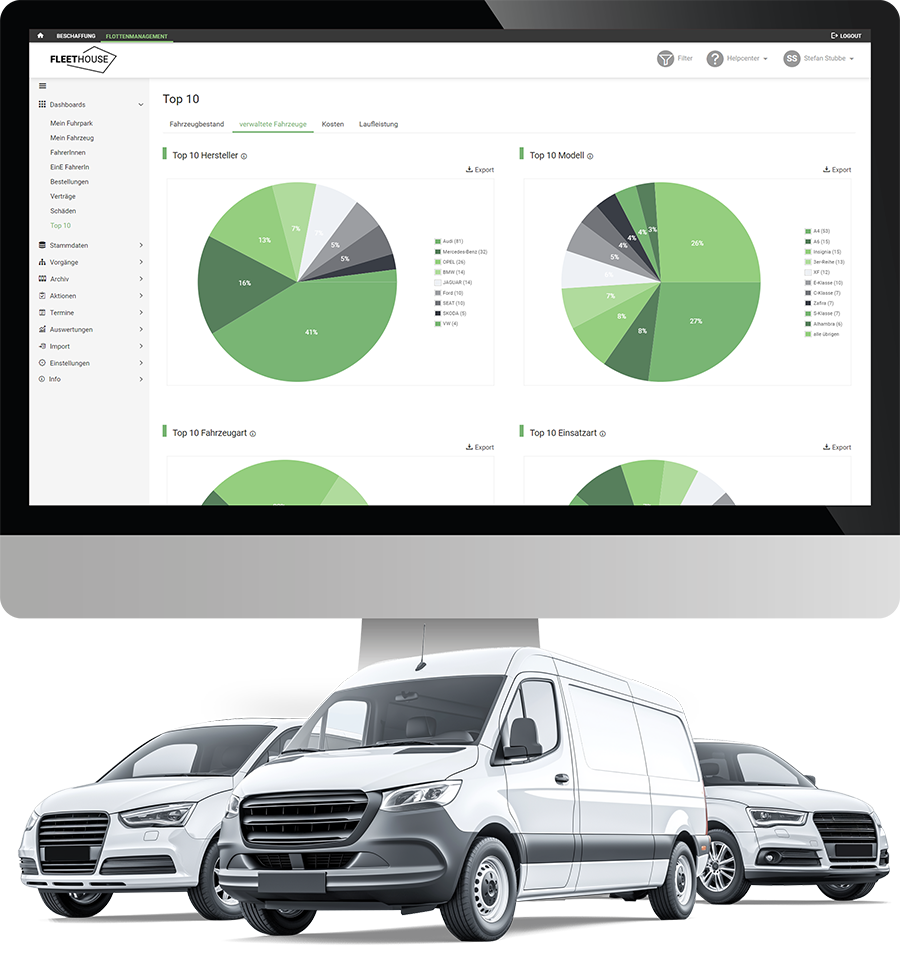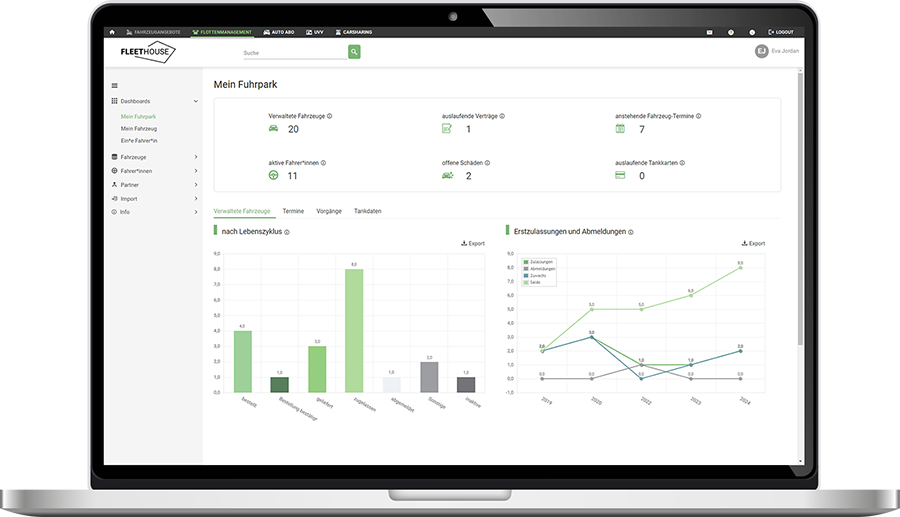At a time when environmental protection and resource efficiency are becoming increasingly important, sustainable fleet management is an indispensable task for fleet managers. Companies are faced with the challenge of designing mobility in such a way that it is ecologically sustainable and at the same time meets operational requirements. In this blog post, we explain exactly how sustainable fleet management works, what goals it pursues and what measures you can take to contribute to climate protection in your fleet.
Contents
What is sustainable fleet management?
Sustainable fleet management goes beyond simply replacing conventional combustion vehicles with more environmentally friendly models. It is a holistic strategy that aims to minimize the environmental impact of the vehicle fleet, reduce operating costs and increase operational efficiency at the same time. It combines various approaches, such as the integration of low-emission vehicles, the optimization of vehicle utilization and the promotion of alternative mobility concepts.
Sustainable fleet management aims to create a win-win situation: While environmentally harmful CO2 emissions are reduced, companies can cut costs and positively strengthen their own corporate image. Specific goals of sustainable fleet management include
- emissions: The use of electric and hybrid vehicles and low-emission models significantly reduces environmental pollution.
- Reduce costs: Optimized route planning and vehicle utilization lead to lower fuel and maintenance costs.
- Strengthen image: Sustainable action is becoming increasingly important for customers, partners and employees. Companies that act sustainably can give their image a positive boost.
- Motivating employees: An environmentally conscious approach can increase employee satisfaction and boost your attractiveness as an employer open_in_new.
Lower emissions thanks to the electrification of the vehicle fleet
Converting the vehicle fleet to electrically powered vehicles marks a significant step for companies towards sustainable mobility. The integration of electric vehicles offers a wide range of ecological and economic benefits that not only help to reduce CO2 emissions, but also represent an economically sensible investment.
Use of hybrid vehicles
Hybrid vehicles are vehicles that are equipped with both a combustion engine and an electric motor. Depending on whether the company car is equipped with a mild or full hybrid engine, fuel savings of up to 25 percent are possible compared to a conventional petrol vehicle of the same size. Switching to hybrid vehicles can therefore save resources and contribute to sustainability.
E-bikes as a mobility alternative
A new trend in the mobility sector is the use of company bikes instead of traditional company cars. E-bikes are particularly well-suited for deliveries by company bus or for covering longer distances. Especially in city traffic, they offer the necessary flexibility and are powerful at the same time. They therefore offer a sustainable addition to the classic company car model and should be considered by fleet managers when planning.

Do you keep an eye on your fleet?
Find out how you can manage your fleet efficiently with Fleethouse.
Sustainable fleet management through eco-driving
Alternative fuels as the key to sustainable fleet management
- Electricity: Electric vehicles use electrical energy from batteries as a power source and produce no emissions during operation.
- Hybrid technology: Hybrid vehicles combine a combustion engine with an electric motor. The energy generated during braking is used to charge the vehicle.
- Hydrogen: Hydrogen-powered vehicles obtain their energy from fuel cells, whereby hydrogen reacts with oxygen to generate electricity.
- Biofuels: Biofuels, such as biodiesel and bioethanol, are produced from renewable raw materials such as vegetable oils or grain. They can be used in conventional vehicles and blended with conventional fuels.
- Natural gas: Natural gas can be used as compressed natural gas (CNG) or liquefied natural gas (LNG) for vehicles and has lower CO2 emissions compared to conventional fuels.
- E-fuels: E-fuels are synthetic fuels that are produced using renewable energies such as solar or wind. They are similar to fossil fuels and can be used in existing combustion engines.
- Liquefied petroleum gas (LPG): Liquid petroleum gas, also known as LPG, consists of propane and butane and has lower CO2 emissions than petrol or diesel.

Sustainable fleet management through corporate car sharing
Corporate car sharing is a key pillar of sustainable fleet management. It not only reduces environmental pollution, but also increases operational efficiency. Instead of assigning each employee their own company car , the vehicle fleet is shared as part of a car sharing concept.
As a result, the pool vehicles are better utilized and expensive downtimes are minimized. As a result, the number of vehicles can be reduced and unnecessary costs avoided. And as fewer vehicles need to be produced, resources can be conserved and environmentally harmful emissions reduced. In addition, car sharing in conjunction with electric vehicles can help to further reduce pollutant emissions.
Telematics and data analysis for sustainable fleet management

The software for your fleet
Measurable targets and transparent reporting for more sustainability in the fleet
The first and most crucial step on the path to sustainable fleet management is to set clear and measurable goals. These targets should be precise, realistic and time-bound. For example, companies can set themselves the goal of reducing the CO2 emissions of their fleet by a certain date and by a fixed percentage or increasing the proportion of electric vehicles within the fleet within a certain period of time.
Regular reporting on progress is a key factor on the road to a sustainable fleet . By continuously collecting and evaluating relevant data, companies can assess their performance, identify strengths and weaknesses and adjust their targets if necessary. This data-based analysis not only enables an objective assessment of progress, but also provides a basis for continuous further development.
FAQ - Frequently asked questions about sustainable fleet management
Making fleet management environmentally friendly offers numerous advantages for companies. Sustainable measures can save resources and therefore also costs in the fleet. As the vehicle fleet is often a major cost center in companies, savings here offer good opportunities to reduce overall costs. In addition, the use of sustainability concepts demonstrates social responsibility and can strengthen the public image of the company. A sustainable image can have a positive effect on employees and customer relations.
Fleet managers have many opportunities to build a sustainable fleet. The purchase of e-cars can help to reduce CO2 emissions. In addition, mobility alternatives such as corporate car sharing or company bikes can be made available to employees instead of company cars. With corporate car sharing, vehicles are used efficiently, downtimes are reduced and resources are saved. For some companies, the introduction of a mobility budget is also a sensible solution.
There are various measures that can contribute to an environmentally friendly driving style and thus support sustainability in the vehicle fleet. In order to reduce CO2 emissions in the fleet, it can be helpful to use fuel-efficient vehicles or electric or hybrid vehicles. In addition, the vehicles with the lowest fuel consumption can be identified with the help of fleet software and included more often in planning. The selection of short routes also helps to save resources and make the fleet even more efficient.
Arrange an online consultation appointment
Arrange your personal consultation appointment now. You can easily select a suitable appointment using our booking tool.
The most important facts about sustainable fleet management
Sustainable fleet management is a comprehensive strategy aimed at minimizing the environmental impact of the vehicle fleet, reducing operating costs and increasing operational efficiency.
Electrification of the fleet, eco-driving, car sharing and alternative fuels are important measures on the way to a sustainable fleet.
The switch to electromobility in the fleet is one of the most important drivers for sustainable fleet management.
Further Fleet Knowledge
If you liked this article and would like to know more about this topic, we recommend these articles.

Vehicle management: importance in the fleet and helpful tips

E-car as a company car: taxes, costs and insurance

Charging electric cars at work: advantages and implementation
Further blog articles on the topic of vehicle fleets and sustainability
Fleet Manager: Tasks, Qualifications and Salary
Fleet management: basics and helpful tips
Fleet at a Glance: Importance, Trends and Technologies
Fleet management without Excel: How to save time and money
Fleet management: How to manage your vehicles efficiently
Pool vehicle agreements: Efficiency for corporate car sharing
Alternative drives: sustainable mobility in the vehicle fleet
Company car leasing: advantages, disadvantages and helpful tips!





